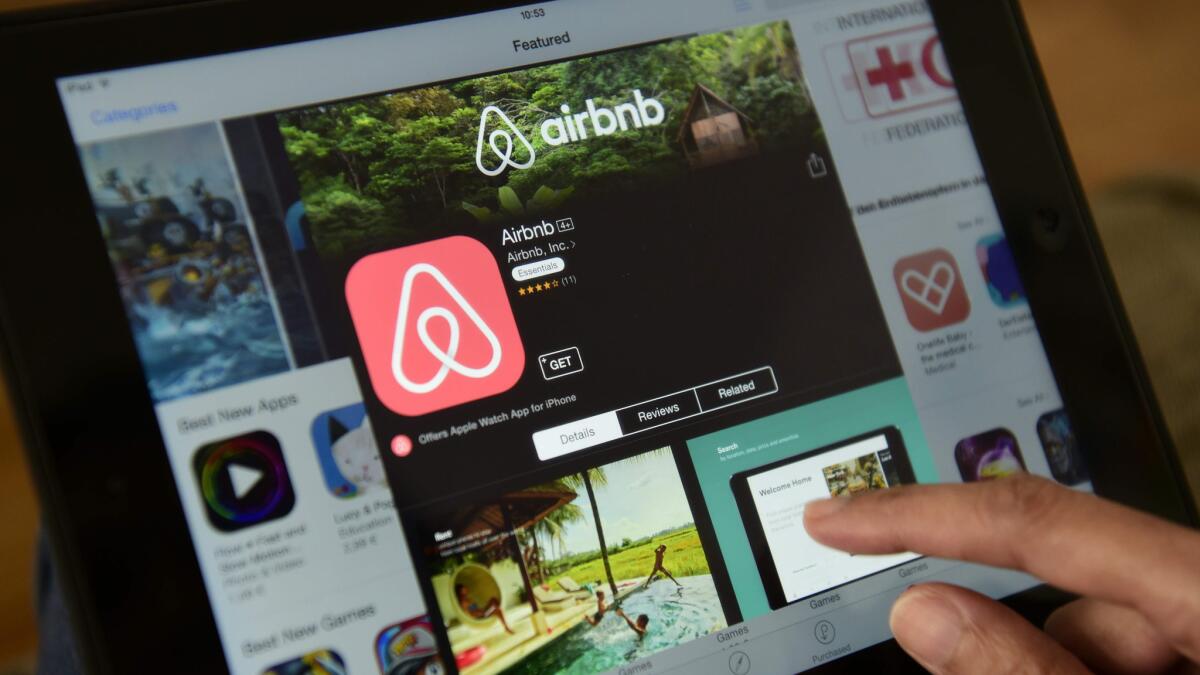Renting an Airbnb home in San Diego could get complicated

- Share via
Most Airbnb and other short-term rentals would be banned in San Diego under a proposal released this week by the City Council president.
The proposal would make a simple definition change in the city’s municipal code: Visitors and tourists would be reclassified as transients if they rent a home for less than 30 days.
Under the proposal, a home could not be rented to transients for less than 30 days in most single-family zones of the city. In a multifamily zone, renters would have to stay at least seven days, Council President Sherri Lightner said.
In addition, renters or owners of single-family homes could not rent out a room or space for less than seven days. Areas that allow visitor accommodations would be permitted to have short-term rentals.
If the rule change goes into effect, the municipal code appears to levy a $2,500 fine per violation and a maximum of $250,000 per parcel of land for violations.
“The purpose and intent of the residential zone is for residents,” Lightner said.
The council is expected to take up the measure at a special meeting Tuesday.
San Francisco-based Airbnb, the largest service that books rentals in San Diego, says it has 4,900 “hosts” within city limits, 67% of whom rent out an entire home, 30% a private space in a home and 3% a shared space.
Amy Faucett, chief operating officer of the San Diego Regional Chamber of Commerce, called on the council to reject the proposal and wait for stakeholders to reach a consensus.
“From a business community standpoint … we all agree it needs to be regulated,” Faucett said at a news conference Wednesday. “You can’t have irresponsible operators in neighborhoods.”
Councilman Chris Cate told reporters that the measure would push short-term rentals “underground, further complicating any regulation and enforcement by the city.” He’d prefer to institute fees, fines and permits to regulate short-term rentals.
Some speakers at Wednesday’s news conference said banning short-term rentals could hurt small business and make housing less affordable.
“I depend on Airbnb to help me live in my place,” said Alicia Sacks, 70, who rents out a futon in her home for about $40 a night. She said she survives on about $620 per month from Social Security and pays more than $800 in rent.
Over the last decade, however, many San Diego residents have complained that investors were buying up houses and renting them out on a short-term basis to people who held loud parties and disrupted the neighborhood.
Airbnb says it collected $7.5 million in transient occupancy taxes within the city in fiscal 2016. Airbnb hosts must register with the city and obtain a city tax number to join the Airbnb network.
ALSO
Qualcomm buying NXP Semiconductors in $38-billion mega-deal
Twitter to slash 9% of its workforce and kill Vine as it tries to eke out a profit
New rule: Internet providers must ask you before sharing your sensitive personal data
More to Read
Inside the business of entertainment
The Wide Shot brings you news, analysis and insights on everything from streaming wars to production — and what it all means for the future.
You may occasionally receive promotional content from the Los Angeles Times.










